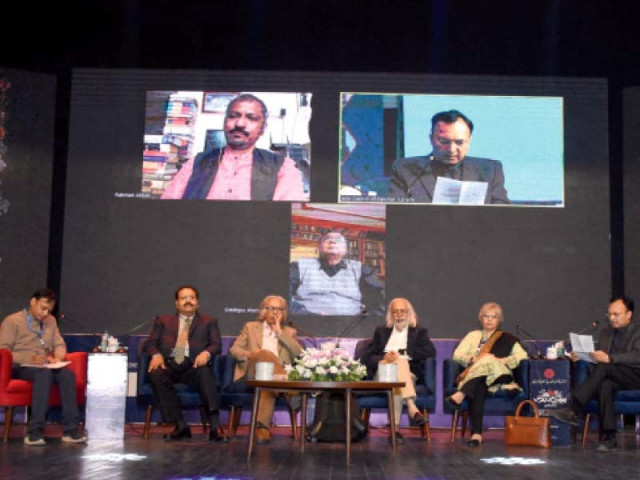Urdu conference sees sessions on novels, children literature
Speakers look into honesty of novelists, fading trend of reading newspapers

The first session of the second day of the 14th International Urdu Conference held at the Karachi Arts Council of Pakistan on the "Contemporary Status of Urdu Novel"
The session was presided over by renowned novelists Khalid Fateh Mohammad and Anwar Sun Rai, while Rehman Abbas from Mumbai, India, gave a presentation on "Studies in Women's Consciousness and Urdu Novel". Siddique Alam from Calcutta gave a presentation on "New Najiba Arif, who was present at the event. Mohammad Hafeez Khan spoke on "Social Changes and Urdu Novel in the Seventy Five Years" while Mohammad Asim Butt taled about "Contemporary Novel: New Voices, New Hopes".
‘Children’s literature should be a priority’
Speakers in the session titled "Children's Literature and New World" said that children's literature is very important.
Children's writers Ali Hassan Sajid, Saleem Mughal, and Romana Hussain also addressed the function. In his address, ACP President Mahmood Sham said that it is very gratifying that the council introduced children's literature at the 14th World Urdu Conference.
"This is the reason this event has been organised on such a large scale," he said. He added that children's literature should not be limited to coloring or understanding puzzles, but should go further.
"It is very important that in primary education, more attention should be paid to training from now on, he said. The president noted that a corner of children's books is reserved in shops all over the world because it is well understood that the foundation of success or failure of a nation is laid in childhood.
"Yes, the state is there, both the mother and the father. If the parents are negligent in the training of the children, then the state takes custody of the child for better upbringing,"
Ali Hassan Sajid said that as long as the children are present, children's literature will survive.
Trend of reading
newspapers diminishing,
say media persons
Leading personalities from the media industry took part in a panel discussion in the Urdu and Media Era session. Dino Ali, Mahim Mehr, Abdullah Sultan, Shafaat Ali, and Faizan Sheikh participated in the discussion while Azmi Al-Kareem acted as the director.
The tradition of reading newspapers and bringing them home has come to an end. English has become so dominant that even a two-year-old child is being taught this language in the present times.
TV anchor Abdullah Sultan said that our children do not know English and have also forgotten Urdu and are looking towards Roman culture while content in Urdu is available on top social networking sites in Pakistan. Fatima Hassan, in response to a question, said that when I speak Urdu, I just speak Urdu. I have studied in Bengal but I speak Urdu well. The quality of ghazal has disappeared in today’s scenario.
People still look for quality books
Addressing the book launching ceremony of important sessions on the second day of the International Urdu Conference, intellectuals and writers said that a good and quality book is still important and people still read books.
Writers should create standard literature. The session was hosted by Ouj Kamal.
Commenting on Qamar Raza Shehzad’s book Khakzar, Mubeen Mirza said that it is both difficult and easy to discuss Shehzad’s creations. It is difficult to talk about 35 years of friendship and it is easy to talk about his poetry.
Qamar Raza Shehzad said that the Arts Council of Pakistan Karachi introduced my book globally. Commenting on Dr. Iqbal Pirzada’s book on paper, Tajdar Adil also read selected poems of Pirzada. He said that Dr. Pirzada is a medical doctor by profession but he also knows the secrets of the chest.
Syed Noman-ul-Haq, while commenting on Haris Khaliq’s book Heeran-e-Sar-e-Bazaar, said that his poetry has been adapted all over the subcontinent. I thought that this book is about ghazals but the poems in it are also wonderful. But he did not break the tradition of ghazals. He is a young poet. He also recited poems of Harris Khaliq. Najiba Arif commented on Hameed Shahid’s book Hairat Ka Bagh and Kashif Raza commented on Sabir Zafar’s book.
On the second day of the conference, in various sessions, Khalid Fateh Mohammad’s novel Waqt Ki Bagh, Wajiha Warsi’s book Jangalistan and a handful of stories by renowned Indian writer Javed Siddiqui were also unveiled.
Published in The Express Tribune, December 11th, 2021.


















COMMENTS
Comments are moderated and generally will be posted if they are on-topic and not abusive.
For more information, please see our Comments FAQ